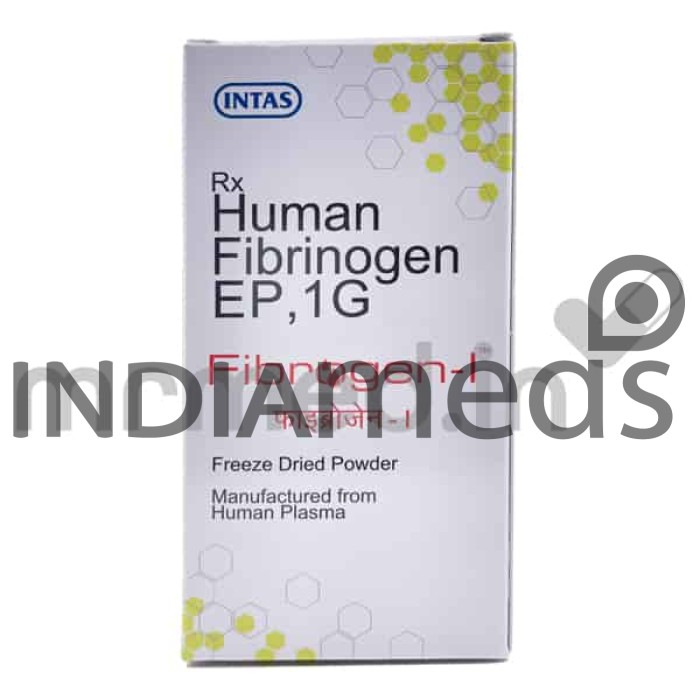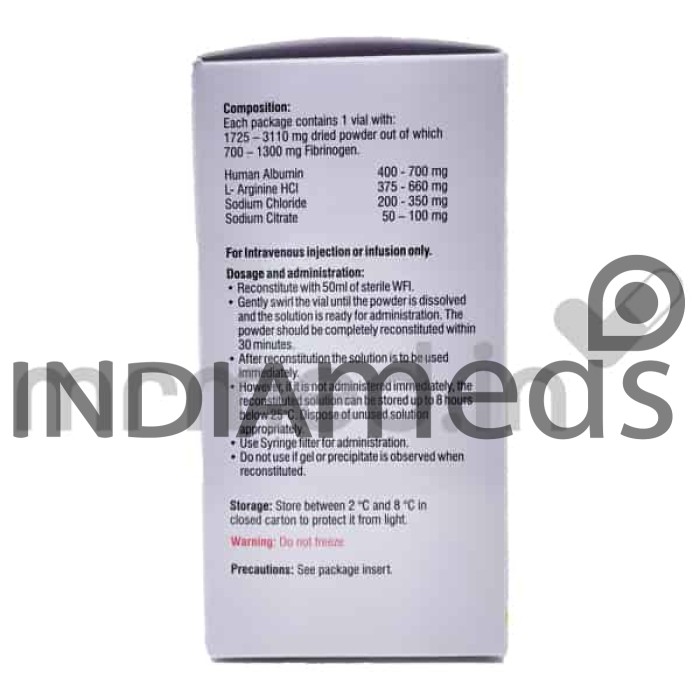Fibrinogen-I Injection contains an active component called as human fibrinogen. It treats bleeding episodes in people with a congenital Fibrinogen deficiency. These deficiencies can be caused by genetic mutations or by liver disease. It can be used as an adjunct to hemostasis (blood clotting) in adults undergoing surgery when control of bleeding by standard surgical techniques is ineffective or impractical. It is also used to help stop the bleeding and prevent further blood loss in cases of massive hemorrhage. It can be given to women who risk delivering their babies prematurely. It is also used in patients with acquired fibrinogen deficiency, which can be caused by liver disease, disseminated intravascular coagulation (DIC), afibrinogen-I Injectionemia, hypofibrinogenemia or other conditions that damage the liver or interfere with its production.
If you have had an allergic reaction to Fibrinogen-I Injection or other blood products in the past, you should not receive it. It should not be given to people who are already actively bleeding. This is because it can increase the risk of forming a blood clot. If you have a history of thrombosis, you should not receive this medication without careful consideration. Special considerations are needed when administering this medication to pediatric and geriatric patients, including dosage adjustments based on age and weight and close monitoring.
- Fibrinogen replacement therapy for bleeding disorders
- Coagulation management in liver diseases
- Disseminated intravascular coagulation (DIC)
- Afibrinogenmia
- Hypofibrinogenemia
Therapeutic Effects of Fibrogen-i Injection
Pregnancy
There is not enough information about the safety of fibrinogen-I injection concentrates in pregnant women. So consult your doctor before using it.
Breast Feeding
Fibrinogen-I Injection concentrate is generally safe to take while breastfeeding. However, talking to your doctor before taking any breastfeeding medication is important.
Lungs
Before using Fibrinogen-I Injection in individuals with lung conditions, consult with a healthcare provider if you have lung conditions.
Liver
If you have liver conditions, consult a healthcare provider before using Fibrinogen-I Injection.
Alcohol
It is not safe to take Fibrinogen-I Injection with alcohol. Alcohol can interfere with how Fibrinogen-I Injection works and increase the risk of bleeding.
Driving
If you have Fibrinogen-I Injection deficiency and you need to drive, it is important to talk to your doctor. Your doctor may recommend that you take it before driving.
Serious
- Allergic Reactions
- Transfusion-related acute lung injury (TRALI)
- Transfusion-associated circulatory overload (TACO)
- Transfusion-transmitted infections
- Thrombosis
- Fluid overload
Common
- Fever
- Chills
- Flushing
- Nausea
- Headache
- Mild allergic reactions (itching, hives)
For individuals with congenital fibrinogen deficiency, fibrinogen-I injection therapy is often required throughout their lifetime to prevent bleeding episodes. The treatment plan is tailored to the patient's specific needs.
While Fibrinogen-I Injection therapy promotes clot formation, it must be administered carefully to avoid excessive clotting (thrombosis). Patients at risk of thrombosis or with a history of clotting disorders should be monitored during treatment.
Yes, excessive fibrinogen-I injection therapy can lead to an increased risk of thrombosis (clot formation). Healthcare providers closely monitor fibrinogen levels during treatment to ensure they remain within the desired range.
Fibrinogen-I Injection may be considered in rare bleeding disorders characterized by dysfunction in fibrinogen function or in cases of acquired fibrinogen deficiencies due to underlying medical conditions.
Whether to continue Fibrinogen-I Injection after experiencing side effects should be carefully evaluated by healthcare providers. In some cases, therapy may be resumed with precautions, while alternative treatments may be considered in others.
Molecule name: Fibrinogen | Therapeutic class: Coagulation Factor Replacement |
Pharmacological class: Hemostatic Agent | Indications: 1. Fibrinogen-I Injection replacement therapy for bleeding disorders 2. Coagulation management in liver diseases 3. Disseminated intravascular coagulation (DIC) 4. AFibrinogen-I Injectionemia 5. HypoFibrinogen-I Injectionemia |





